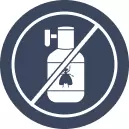Maintaining a healthy and vibrant garden often means protecting your plants from harmful insects. Pests can wreak havoc on your lawn, flowers, vegetables, and shrubs, causing damage that impacts plant health and aesthetics. Insecticides provide an effective solution, offering targeted protection against a wide range of pests.
Whether you’re managing a home garden or a larger green space, the right insecticides can help ensure your plants remain healthy and pest-free. Here’s a detailed guide to understanding, choosing, and using insecticides.
Explore our Herbicides for sale.
What Are Insecticides?
Insecticides are substances designed to kill or repel insects that threaten plant health. They work by targeting pests that feed on or inhabit your garden plants, effectively reducing infestations and preventing further damage. Insecticides can be classified into several types based on their mode of action and formulation.
Types of Insecticides
- Contact Insecticides: These kill pests upon direct contact, making them ideal for managing visible infestations.
- Systemic Insecticides: Absorbed by plants, these circulate through the plant’s system, targeting pests that feed on plant tissues.
- Repellents: Designed to deter pests, these insecticides prevent insects from settling on plants.
- Growth Regulators: These disrupt the life cycles of pests, preventing reproduction and infestations over time.
Common Pests Controlled by Insecticides
Insecticides are effective against a variety of pests that commonly invade gardens, including:
- Aphids: Tiny insects that suck sap from plants, causing wilting and stunted growth.
- Caterpillars: Larvae that feed on leaves and stems, often defoliating plants.
- Whiteflies: Small, flying pests that weaken plants by feeding on their sap.
- Japanese Beetles: Known for skeletonizing leaves, these beetles can quickly destroy plants.
- Grubs: Beetle larvae that damage roots, causing patches of dead grass and poor plant health.
Why Use Insecticides?
Incorporating insecticides into your gardening routine offers numerous benefits, particularly for maintaining plant health and preventing infestations.
- Pest Eradication: Insecticides provide targeted control, eliminating pests that harm plants and ensuring a healthy, thriving garden.
- Plant Protection: By managing pests, insecticides prevent damage to leaves, stems, roots, and flowers, preserving the overall health and appearance of your garden.
- Increased Yields: For edible gardens, such as those growing vegetables or fruits, insecticides help protect crops, leading to higher yields and better-quality produce.
- Ease of Use: Modern insecticides are designed for convenience, with formulations such as sprays, granules, and concentrates that are easy to apply.
How to Choose the Right Insecticide
Selecting the most effective insecticide depends on several factors, including the type of pest, the plants you’re protecting, and your preferences for eco-friendly solutions.
Identify the Pest
Understanding which pest is causing damage is the first step in choosing the right insecticide. Look for specific signs of infestation, such as chewed leaves, discolored foliage, or visible pests.
Choose the Right Formulation
- Sprays: Ideal for targeting pests on leaves and stems.
- Granules: Useful for soil-dwelling pests like grubs.
- Concentrates: Cost-effective and customizable, allowing dilution for larger applications.
Opt for Targeted or Broad-Spectrum Products
Targeted insecticides focus on specific pests, reducing collateral impact on beneficial insects. Broad-spectrum products are effective against a wide range of pests but should be used carefully to avoid harming pollinators and other garden allies.
Consider Eco-Friendly Options
If you prefer sustainable gardening practices, choose organic or natural insecticides made with ingredients like neem oil, pyrethrin, or diatomaceous earth. These minimize environmental impact while still providing effective pest control.
Tips for Using Insecticides Effectively
Proper application is key to achieving the best results while ensuring safety for yourself, your plants, and the environment.
- Follow Label Instructions: Read and follow the manufacturer’s instructions regarding dosage, application frequency, and safety precautions.
- Apply at the Right Time: Insecticides are most effective when applied during the early morning or late afternoon when temperatures are cooler, and beneficial insects are less active.
- Target the Right Areas: Focus on the parts of the plant where pests are most active, such as the undersides of leaves or areas with visible damage.
- Use Preventively: Regularly inspect your plants for signs of pests and apply insecticides as a preventative measure if infestations are likely.
- Rotate Products: To prevent pests from developing resistance, alternate between different insecticides or modes of action.
Eco-Friendly Considerations
While insecticides are essential for pest control, it’s important to minimize their environmental impact. Here are a few tips to keep your garden safe and sustainable:
- Use organic or natural insecticides whenever possible.
- Avoid over-application, as this can harm beneficial insects like bees, butterflies, and ladybugs.
- Implement integrated pest management (IPM) practices by combining insecticides with other control methods, such as companion planting or physical barriers.
Final Words
Insecticides are indispensable tools for maintaining a healthy, pest-free garden. By understanding the types of insecticides available and using them judiciously, you can protect your plants from harmful insects while promoting vibrant growth and productivity.
At Growcycle, we offer a diverse selection of high-quality insecticides designed to meet the needs of every gardener. From eco-friendly options to powerful solutions for tough pests, our products ensure your garden remains a thriving, beautiful space. Explore our range today and protect your lawn and plants with confidence.



